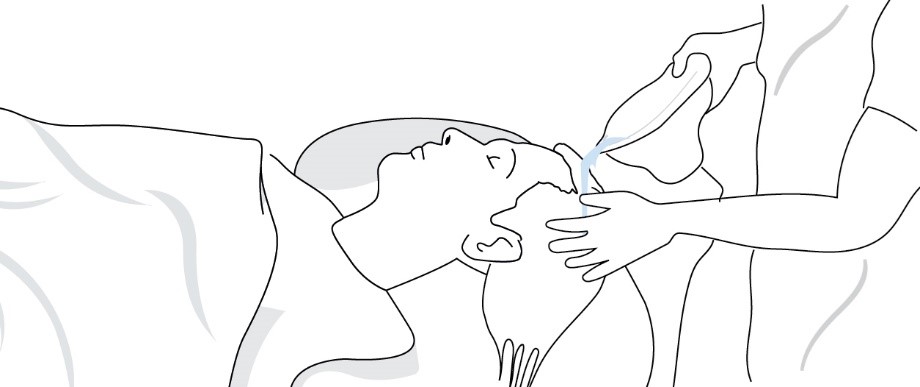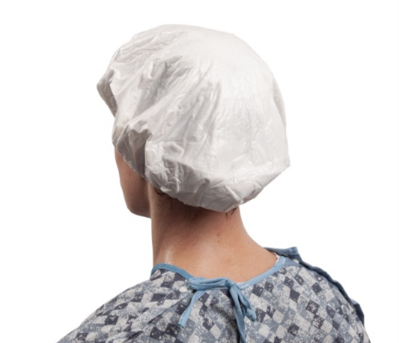In hospital settings, maintaining the hygiene and comfort of bedridden patients is of high importance. Hair washing and styling play an important role in patient well-being as well as for boosting their self-esteem. For bedridden patients, traditional methods of hair washing can be a challenging, time-consuming, and often uncomfortable process.
However, developments in patient care have led to innovative solutions such as disposable shampoo caps, offering a convenient and effective alternative to traditional hair washing methods.
Challenges of Traditional Hair Washing
Traditional hair washing methods for bedridden patients in hospitals involve washing the hair using water, basins, shampoo, and towels1. As bedridden patients have limited mobility, while the patients are lying in bed, nurses place a basin under the patient’s head, pour water to wet the hair, apply shampoo, and rinse. This process not only takes time and effort but can also be uncomfortable for the patient.
In addition to being a labour-intensive task, this method involves physically lifting and repositioning patients, which can be uncomfortable and difficult, especially for patients with limited mobility. The physical handling of a patient presents difficulties for the nurses as well.
Additionally, traditional hair washing may increase the risk of infection and skin irritation due to prolonged exposure to water basins and soaps2. Last, but not least, nurses need to dedicate a significant amount of time to a single patient just for the hair washing process.


Traditional hair wash is done when the patient is lying on the bed, a basin is put under the head, and the nurse pours water over the hair.


Disposable Shampoo Caps: A Game-Changing Solution
Disposable shampoo caps offer an innovative solution to the challenges presented by traditional hair washing methods in hospital settings. These shampoo caps come pre-moistened with a gentle cleansing solution, eliminating the need for water, soap, and additional products.
Nurses may quickly and effectively wash a patient's hair without repositioning or rinsing, simply by placing the cap on the patient's head, massaging it to disperse the cleansing solution, and then removing and discarding the cap.
Disposable shampoo caps can also be warmed in a microwave to increase patient comfort. After heating the cap, it is placed on the patient’s head, and the nurse gently massages the cap to distribute the cleansing solution. This effective and simple process reduces the physical strain on patients and healthcare staff, as it eliminates the need for lifting, repositioning, and handling water.
Advantages of Disposable Shampoo Caps
Disposable shampoo caps are designed to reduce the risk of infections, as the process eliminates the use of basins and water, which pose a potential risk as a source of waterborne infections3.
Additionally, disposable shampoo caps shorten the amount of time needed to wash hair, allowing nurses to allocate more time for other vital patient care tasks. In high-demand healthcare environments, this time-saving capability can be crucial.
For the patients who may already be feeling vulnerable, having their hair cleaned without complex repositioning can have a positive impact on their emotional well-being.
Incorporating disposable shampoo caps into the standard care protocol for bedridden patients in hospital settings can significantly improve patient comfort, hygiene, and overall quality of care. With their ease of use and effectiveness, shampoo caps represent a valuable innovation in patient care practices.
The Medline solution: EasyBath Shampoo Caps
Medline’s EasyBath® Shampoo Caps allow hair to be washed and conditioned from the hospital bed without water. These hair wash caps are pre-moistened with a rinse-free shampoo and conditioner for a one-step hair-washing system that requires no additional preparation or clean-up for most hair types and lengths. Check out for more information: EasyBath® Shampoo Caps | Medline UK
References:
- Goldenhart, A. L., & Nagy, H. (2021). Assisting patients with personal hygiene. StatPearls. https://pubmed.ncbi.nlm.nih.gov/33085302/
- Coyer, F. M., O’Sullivan, J., & Cadman, N. (2011). The provision of patient personal hygiene in the intensive care unit: A descriptive exploratory study of bed-bathing practice. Australian Critical Care, 24(3), 198–209. https://doi.org/10.1016/j.aucc.2010.08.001
- Clarke AP. Nosocomial infections and bath water: Any cause for concern? Clinical Nurse Specialist 2006;20(3):119—23.


Zeynep Ergeneci
Product Manager ReadyCare, Personal Care, Advanced Wound Care and Repositioning & Offloading, Medline Europe
Zeynep, originally from Turkey, came to the Netherlands in 2020 to complete her Master of Science in Economics. She has graduated in 2021 and completed an internship in sales analysis. After that, she joined Medline Europe and is currently managing Medline’s urology and ReadyCare portfolios. Zeynep has a passion for travelling, exploring new cultures and really enjoys nature. Learn more on Linkedin.


